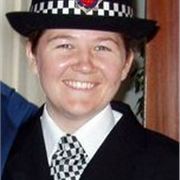 Fiona BoneTribute to Fiona Bone – read at her funeral service Thursday 4 October by Sir Peter Fahy
Fiona BoneTribute to Fiona Bone – read at her funeral service Thursday 4 October by Sir Peter Fahy
Fiona Bone joined Greater Manchester Police in November 2005 as a volunteer Special Constable on North Manchester Division. She became a full time officer in January 2007 and was posted to the Tameside Division.
It is clear that helping people and building community spirit was at the heart of everything she did. Not only was she a Special Constable, she worked with St John Ambulance, had set up a women’s five-a-side team and was an active member with the Waterway Restoration Group.
After graduating from the University of Central Lancashire, Fiona set about her ambition of becoming a police officer, working in a number of customer service roles to gain experience of serving the public.
In the force she quickly gained recognition as an officer who set the highest standards for herself and for others. Like all new officers she saw life at its most raw, was alongside people at the worst moment of their lives and like all young officers no doubt protected her parents from the full story of what she saw and what she dealt with. She quickly understood that virtue is often not its own reward that there are many frustrations in policing but much satisfaction. While others often seem obsessed with policing in films, crime novels and fly on the wall documentaries Fiona did it for real. Like most police officers Fiona absolutely loved her job and felt privileged to serve the public in this way.
Fiona quickly accepted that she was now part of a disciplined service where staff just get on with whatever is asked of them across the full range of incidents and crimes often going into situations where the risk is unknown but where you put service to the public ahead of yourself. It was in going about her duty in this quiet conscientious way that she met her death.
Fiona’s work received much praise. In October 2009, Fiona was awarded a Chief Superintendent's Commendation for her outstanding contribution to an investigation relating to burglaries and robberies. She was commended for her dedication and determination in securing the convictions of those involved, “throughout the complex investigation.”
Fiona treated everyone with dignity, compassion and respect whatever their background. In 2010, she received a letter of thanks from a person she had arrested and prosecuted. In the letter, the individual thanks Fiona for her assistance in getting him help to change his ways and for being “a decent police officer”.
In his sermon to the National Police Memorial Service on Sunday the Archbishop of York said that in getting so close to the community instead of staying aloof, police officers make themselves more vulnerable.
Sir Robert Peel the father of modern policing saw it thus....... "To maintain at all times a relationship with the public that gives reality to the historic tradition that the police are the public and that the public are the police, the police being only members of the public who are paid to give full time attention to duties which are incumbent on every citizen"
This philosophy was in the DNA of Fiona's approach to policing. She understood that openness, accountability and integrity are central to police effectiveness and the confidence of the public. Whatever may have been national stories of police failings from times before she joined she knew the best way forward was the daily commitment to duty getting on with serving and protecting the public. It is this quiet devotion to duty from Fiona and Nicola which have inspired so many thousands to send in messages of sympathy to their families. Fiona and Nicola knew that policing makes no distinction between what it asks of male and female officers indeed this is what attracted them
Fiona may have been small in stature but was unquestionably huge in personality, drive and her desire to make a difference. Her personal attributes included an innate ability to deal with people from all kinds of backgrounds and to deal with them in such a way that the interaction was always positive and impressionable.
Her contribution related not just to her work but to her personality, to her character and presence within the team and within the force. She had great promise for the future.
Fiona wanted to become a police officer to help others. No one can deny that she achieved that aim with honours. She did it in such a way that the memory of her humanity and dedication will last forever within the hearts of those who had the pleasure of knowing her and working with her. We will never forget her great sacrifice.
 Nicola HughesTribute to Nicola Hughes - read at her funeral service Wednesday 5 October by Sir Peter Fahy
Nicola HughesTribute to Nicola Hughes - read at her funeral service Wednesday 5 October by Sir Peter Fahy
Constable Nicola Hughes joined Greater Manchester Police on 3rd August 2009.
She was then only twenty one years old which many will recognise as young for a recruit today but it shows she impressed the selection panel with her readiness for the challenge ahead.
Despite her young years, she was incredibly mature, something that was recognised and reported upon by her former College tutor, Tim Thompson, who stated that Nicola was mature beyond her years, displaying high levels of initiative when working in a team or as an individual. He also said that Nicola had a great sense of humour, was always polite and cheerful.
Nicola spent her service first as a neighbourhood officer and then as a response officer on C relief at Tameside Division.
She set high standards for herself and impressed everyone with her dedication and her cheerfulness. She had huge amounts of energy and initiative.
Nicola's family talk of that proud moment which all police officers will remember when you bring your uniform home for the first time and put it on to show your family and have photographs taken. And you wonder whether you will up be able to meet the standards the public expect of that uniform, will you be able to fill those boots - in Nicola's case there was never any doubt.
She showed herself highly capable in situations of disorder, brave when searching apparently unoccupied premises and going into the unknown but on the other hand showed great compassion to victims of crime and on one occasion stopped her police van to rescue a mouse being fought over by two cats.
Nicola stepped forward to become a police officer knowing full well the risks involved given that her father Bryn is a prison officer. She decided not to be a bystander but to join the fray.
Nicola like Fiona had many of the qualities we see in our young police officers and in young people in general. They do not have the prejudices and hang ups of my generation and take people as they are whatever their background. They have a great skill for communicating, showing compassion and empathising with the experience of others. They have great patience. They are great at making friends and keeping them. Nicola showed all these qualities.
Nicola signed up to the police service knowing that she would put herself in danger. She understood that the unarmed status of British policing is not some tactical option or us holding on to an historic tradition now out of date. She understood it is central to our commitment to the minimum use of force to our relationship with the public and to serving citizens rather than controlling them as some arm of the state
As Sir Robert Peel laid down in 1829 "by ready offering of individual service and friendship to all members of the public without regard to their wealth or social standing, by ready exercise of courtesy and friendly good humour; and by ready offering of individual sacrifice in protecting and preserving life." Nicola made that sacrifice
In his sermon at the national Police Memorial Service the Archbishop of York said that peace-making is a costly business and that those who work to bring justice bear the wounds of love in doing so. Nicola sadly died from those wounds through her own devotion to others
Nicola in her dedication and professionalism in the way she carried out her duties showed that policing is not about muscle but is about reason, restraint and intelligence. She had a promising career ahead of her but was driven not by personal ambition but by service to the public in need.
It is abhorrent that she met her death through an evil, dark act but the best tribute we can make to her memory is that we continue to uphold the standards and the style of policing she demonstrated so well and ensure that might does not conquer over justice.
It is clear from every conversation we have with them that her family were so proud of Nicola. She was a fighter whether engaged in her favourite sport of karate or fighting for justice for a victim of crime. Nevertheless it is her warm smile and her gentleness that stand out from every picture of her. She will be greatly missed by everyone that knew her. We will never forget her great sacrifice.









